 Coaches is a fairly common term used in small group ministry circles to identify mentor/shepherds who oversee many small groups. In some churches they are called Directors, Coordinators, Ministry Leaders, Community Shepherds, etc.. In military terms if small group leaders are Sargeants, Coaches are the Lieutenants.
Coaches is a fairly common term used in small group ministry circles to identify mentor/shepherds who oversee many small groups. In some churches they are called Directors, Coordinators, Ministry Leaders, Community Shepherds, etc.. In military terms if small group leaders are Sargeants, Coaches are the Lieutenants.
We started with a passion for helping churches make multiplying disciples and realized from the very beginning that this coaching level was key to building and ensuring consistency in the execution of a church's vision.
Here's how Churchteams helps churches "Aim" their coaches.
Rear Sight - How To Find And Organize Coaches
The obvious place to start looking for coaches is among your group leaders. You are looking for leaders with experience who also have an elementary understanding of the discipleship objectives of group life. You can use data to help you find group leaders with the gift of leadership, encouragement or discernment for instance.
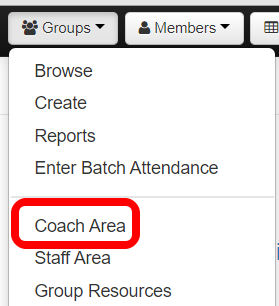 Set up your coaching organization by clicking groups then Coach Area. If the Coach term has been customized (Settings / Basic Settings, step 1), you will see that name in the circled position.
Set up your coaching organization by clicking groups then Coach Area. If the Coach term has been customized (Settings / Basic Settings, step 1), you will see that name in the circled position.
On the next page find and add the people who serve this role in your church.
Once you choose a coach, you can click on their name to go to their coaching page and add in the groups that they oversee. This becomes the coach's hub for tracking and communicating with their leaders.
Add in an additional level of oversight by selecting Staff Area (or similar term) and choosing the Coaches that the staff person oversees. This becomes the staff's page for tracking and communicating with their coaches.
Click on the Reports button in the black navigation bar across the top, then choose Organizational Chart to see your entire ministry organizational structure. It will look like this:
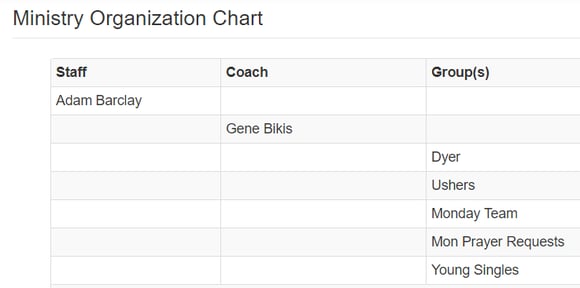
Besides giving you a visual overview of your ministry structure, setting up the organization this way also:
- Copies Groupfinder generated emails sent to leaders to the upline coach and staff.
- Sends copies of group meeting reports to their upline coach and staff.
Front Sight - How To Build Culture And Train Coaches
A coaching culture is built by training on values, using common language and embracing common tools.
Training on the vision and values of small groups and small group coaching is essential for building culture. Otherwise, every leader is doing their own thing and the ministry feels disjointed. Here are four ways to use Churchteams to develop training structure and feedback depending on training approaches.
- Create an event or group and use the Registration features for open-ended invitations.
- Use the RSVP feature for a closed group of invitees to accept or decline participation.
- Benchmark training course completion using member attributes.
- Use attendance reports to track ongoing coaches meetings. Helps track consistency which is an indicator of commitment.
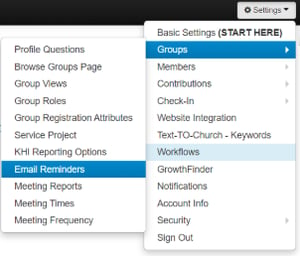 Training with ongoing gatherings builds the values and language for coaches. Churchteams is the common tool for execution and communication. This happens as coaches embrace it for monthly reporting on their interactions with leaders. Go to Settings / Groups / Email Reminders to find the option to Enable Coach email reminders. You can even edit up to 4 times per month for them to receive these.
Training with ongoing gatherings builds the values and language for coaches. Churchteams is the common tool for execution and communication. This happens as coaches embrace it for monthly reporting on their interactions with leaders. Go to Settings / Groups / Email Reminders to find the option to Enable Coach email reminders. You can even edit up to 4 times per month for them to receive these.
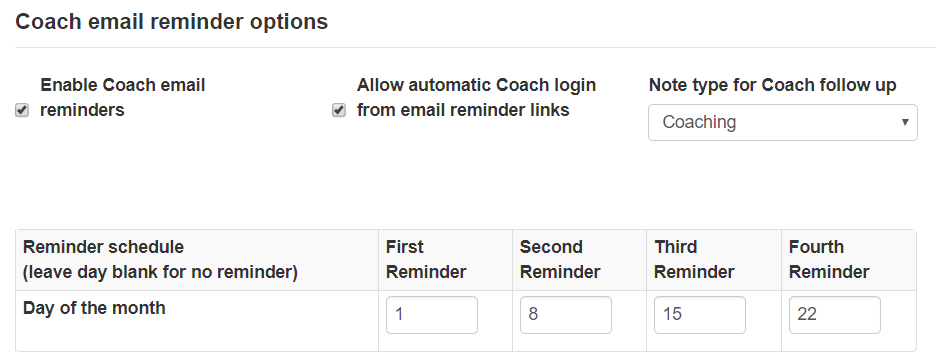
Coaches are sent an email that provides a link back to their Coaching page and a list of their leaders. One click on a leader's name takes the coach to a page to enter a coaching note on their interaction with that leader. These can be reviewed on the coaching page. They are used to track things like praises, problems and plans for the leader and their group.
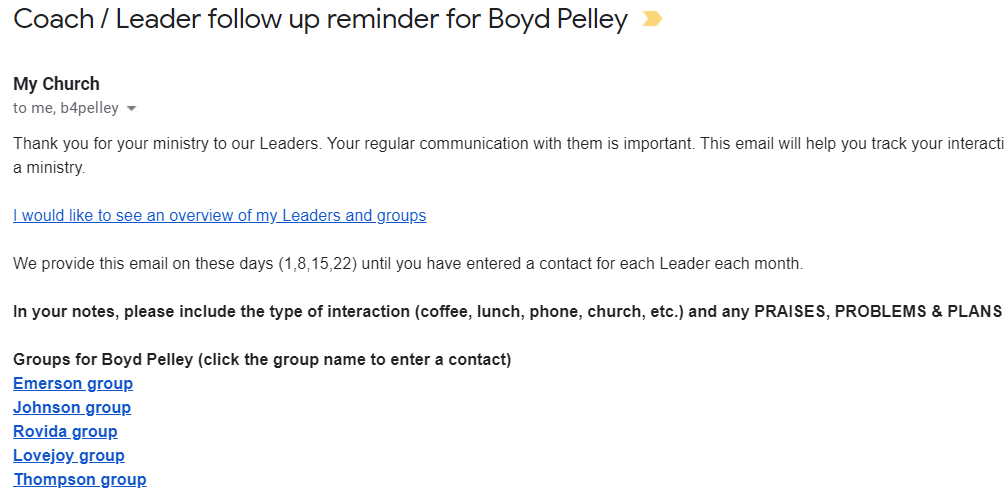
We will talk more about using coaching reports to help the small group pastor(s) develop coaches in the next post. The goal for this section is to demonstrate how to setup and embrace Churchteams as the common tool for executing a coaching culture.
Target - How To Track Leader Development
The purpose of the coaching reports is to help coaches track their objective and interactions with group leaders. These notes become a leadership development trail that helps coaches mentor and shepherd their leaders.
Because the coach is copied in on the meeting report from each leader each time their group meets, they are seeing how a leader interacts with his/her people. Used optimally, this report reminds the coach to pray for that leader. Often in the course of prayer the Lord gives the coach other insights that are helpful for mentoring that leader. A simple reply back in the email gives the coach a way to instantly share the insight. Then by clicking a link on their coach report, the coach enters the same insight as a note on the leader's member record and schedules a follow up reminder.
Another best practice is for the small group pastor to give coaches access to a "Potential Leader" group. When a coach spots someone they think might be a potential leader, they have permission to add that person to this group. It's a great way to keep funneling people into the leadership pipeline.



